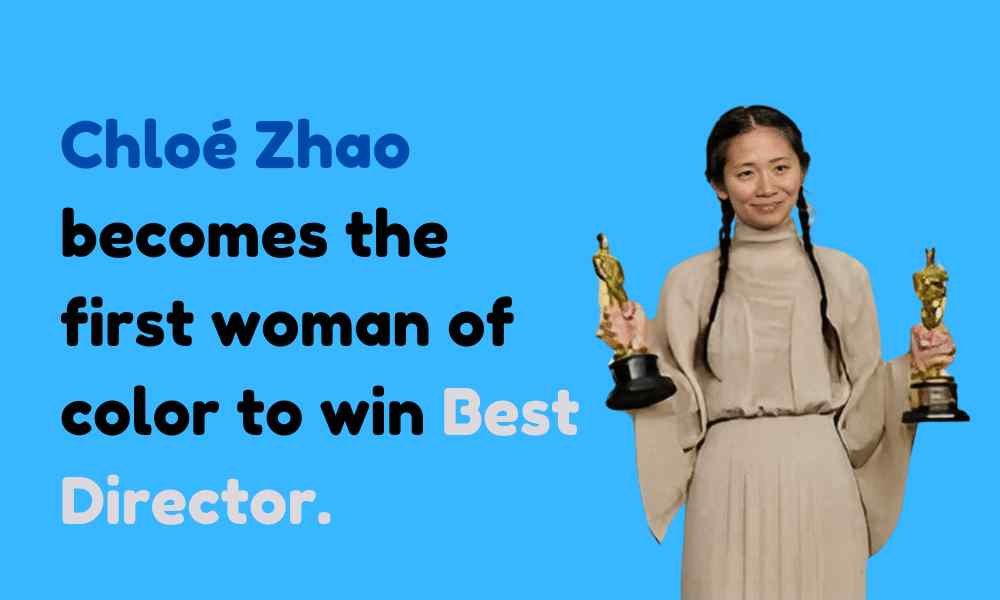“Chloe Who Directed NYT Nomadland” has turn out to be a charming access in crossword puzzles, specially The New York Times’ renowned brainteasers. This surprising look underscores the wonderful variety of her impact throughout various domain names. The acclaimed director of ‘Nomadland’ is not fully celebrated in the cinematic world. Chloe, who directed the film, is now challenging crossword enthusiasts. This specific connection in the “Chloe Who Directed Nomadland NYT Crossword” serves as a testament to the large-accomplishing have an effect on of Chloe Zhao’s creativity and expertise. It transcends traditional barriers, proving her effect extends far past the area of entertainment and into the intellectual world of wordplay.
Chloe Zhao: A Rising Star
On Sunday, Chloé Zhao became the first woman of color, the first Chinese woman, and the second woman ever to win the Oscar for directing. This achievement caps off a remarkable run of honors she has earned this awards season for her work on the drama ‘Nomadland..”In accepting the award, Zhao recalled a word she had learned as a baby that she said translated from Mandarin to “humans at start are inherently suitable.”

“I actually have usually determined goodness in the humans I met everywhere I went inside the world,” she stated. “So that is for everyone who has the religion and the courage to keep on to the goodness in themselves. And to keep directly to the goodness in every other, irrespective of how hard it’s far to do this. And this is for you, you inspire me to keep going.”
Early Life and Background
Chloe Zhao grow to be born in Beijing, China, in 1982. Growing up, she developed a ardour for storytelling and filmmaking. Which sooner or later led her to pursue her goals inside the United States. After training at Mount Holyoke College and NYU’s Tisch School, Zhao began her career in the film industry.
Journey to Filmmaking
Zhao’s directorial debut came with the 2015 movie “Songs My Brothers Taught Me,” which garnered important acclaim for its actual portrayal of existence on the Pine Ridge Indian Reservation. However, it changed into her sophomore characteristic, “The Rider” (2017), that catapulted her to global reputation. The movie earned severa awards and nominations, setting up Zhao as a rising celebrity within the international of cinema.
Nomadland: A Masterpiece
Synopsis
Nomadland, released in 2020, is a poignant drama based on Jessica Bruder’s non-fiction e book of the identical call. The film follows Fern, a woman in her sixties who journeys across the American West after losing everything in the Great Recession. As Fern embraces life as a modern-day nomad, the film beautifully captures the resilience of those on society’s fringes.
Directing Style
Zhao’s directorial approach in “Nomadland” is characterised with the aid of its minimalist yet immersive storytelling. She blends scripted factors with real-life reviews, often casting non-professional actors to bring authenticity to her narratives. Through breathtaking cinematography and understated performances. Zhao invites audiences to contemplate topics of freedom, community, and the human connection to nature.
New York Times Crossword: A Pop Culture Phenomenon
Overview
The New York Times crossword puzzle has been a staple of American tradition since its inception in 1942. With its smart clues and difficult grids, the puzzle has captivated tens of thousands and thousands of lovers global. What gadgets the New York Times crossword apart is its capability to reflect modern activities, trends, and famous lifestyle. Making it a dynamic and ever-evolving hobby.
Popularity and Influence
In latest years, the New York Times crossword puzzle has skilled a resurgence in reputation. Thanks in element to its accessibility thru virtual systems.
Social media has played a key role in fostering a sense of community among crossword enthusiasts, who share tips, triumphs, and challenges online. As a end result, the crossword has turn out to be greater than only a daily diversion—it is a cultural phenomenon.
The Collaboration: Chloe and the New York Times Crossword
Discovery
The surprising connection between Chloé Zhao and the New York Times crossword puzzle began when solvers noticed her name in the clues. Initially dismissed as a coincidence, it soon have become obvious that Zhao’s impact had permeated the puzzle’s lexicon. With references to “Nomadland,” her filmmaking style, and even personal information from her existence.
Impact on Pop Culture
Zhao’s inclusion inside the New York Times crossword puzzle speaks to her growing influence in famous way of life. As a filmmaker whose work resonates globally, she has transcended traditional cinema to become a cultural touchstone. By bridging the worlds of film and puzzles. Zhao has in addition solidified her place within the zeitgeist, fascinating audiences in surprising approaches.
people who can see the future crossword:
The word “individuals who can see the future” may be a clue in a crossword puzzle, and the answer might be “seers” or “clairvoyants.” In crossword puzzles, clues often employ wordplay, synonyms, or precise references to guide solvers to the right solution. “People who can see the future are believed to foresee events or gain insight through extrasensory perception or supernatural means. In the context of the puzzle, the clue prompts solvers to consider words or terms associated with this idea. Ultimately leading them to fill in the correct answer in the crossword grid.
Conclusion
In end, Chloe Zhao’s top notch journey from indie filmmaker to Academy Award-prevailing director has captivated audiences worldwide. With Nomadland, she has crafted a cinematic masterpiece that continues to acquire accolades and encourage viewers. Additionally, her sudden look in the New York Times crossword puzzle stands as a testament to her cultural effect and lasting relevance in trendy ever-changing panorama of enjoyment and popular way of life.
Unique FAQs
Has Chloe Zhao ever commented on her inclusion in the New York Times crossword puzzle?
While Zhao has no longer made any public statements specifically addressing her presence in the puzzle, she is known for her humility and appreciation of unexpected moments of recognition.
Are there different filmmakers or celebrities who’ve been featured inside the New York Times crossword puzzle?
Yes, the crossword frequently includes references to prominent figures in diverse fields, including Enjoyment, politics, sports, and literature.
Has Chloe Zhao’s success influenced the portrayal of woman directors within the media?
Zhao’s achievements have certainly contributed to a broader communication about gender illustration in filmmaking and the significance of various voices in the industry.
What impact has “Nomadland” had on the depiction of nomadic existence in famous culture?
“Nomadland” has sparked discussions approximately the realities of life on the street and challenged stereotypes surrounding nomadic communities. Fostering greater empathy and knowledge amongst audiences.
How can aspiring filmmakers draw suggestion from Chloe Zhao’s work?
Aspiring filmmakers can analyze from Zhao’s emphasis on authenticity, storytelling, and collaboration, recognizing that splendid filmmaking transcends conventional limitations and conventions.
you get where i’m coming from crossword?
Yes, I apprehend what you are asking. You reference the word game “get where I’m coming from” in the context of a crossword puzzle clue. The clues in quotation marks often contain metaphors, double meanings, or subtle explanations that help solvers find the right answer. “Get wherein I’m coming from” may be a clue for a word or phrase associated with know-how someone’s perspective or viewpoint. Crossword fans enjoy interpreting these clues and locating the corresponding answers, adding to the a laugh and task of solving the puzzle.
ones who don’t want to hear nyt crossword?
The clue “ones who don’t need to hear” in a New York Times crossword puzzle possibly refers to a particular organization of individuals or a concept related to fending off statistics or ignoring sure voices. In this context, capacity answers should encompass “deaf ears” or “selective listeners.” Crossword clues often depend on wordplay, double meanings, or idiomatic expressions to lead solvers to the appropriate solution. In this case, the clue activates solvers to reflect onconsideration on terms associated with brushing off or refusing to well known some thing, in the end guiding them to fill in the best answer in the crossword grid.
what can be everything but not anything crossword?
The clue “what can be the whole lot however now not some thing” in a crossword puzzle hints at a idea or term that encompasses everything however has particular obstacles. The solution might be “some thing” or “nothing.” In crossword puzzles, clues regularly rely on wordplay, double meanings, or philosophical principles to guide solvers to the perfect answer. In this situation, the clue activates solvers to think about words or terms that encapsulate the concept of being inclusive but incredible. Ultimately, solvers ought to decipher th
who i used to be with the crossword?
The clue “who I used to be with” in a crossword puzzle indicates a phrase or phrase associated with beyond relationships or companionship. In this context, the answer can be “ex,” referring to a person who became formerly in a romantic courting with the solver. Crossword clues regularly make use of wordplay, double meanings, or precise references to guide solvers to the suitable answer. In this case, the clue activates solvers to think about terms related to former companions or giant others, in the long run guiding them to fill in an appropriate solution inside the crossword grid.


